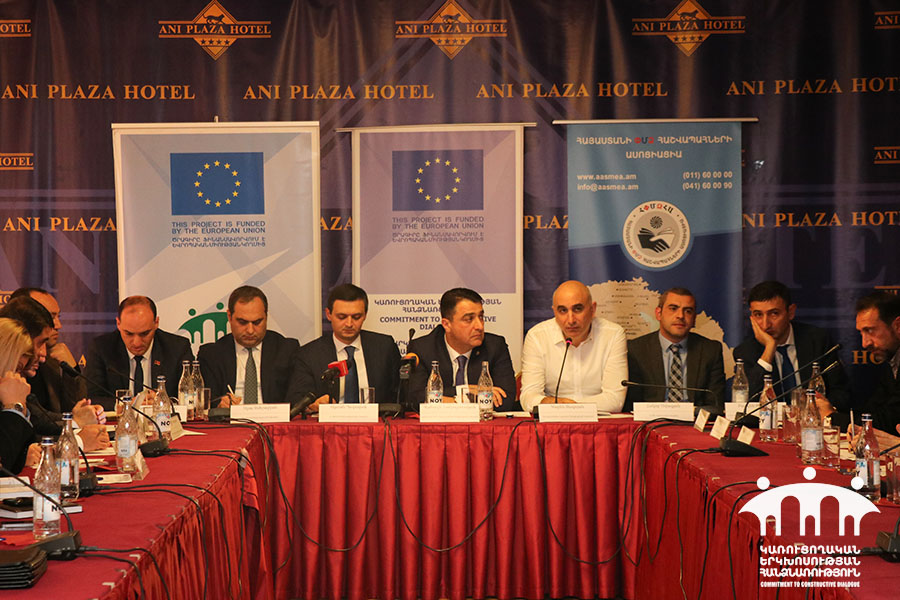
A wave of protest has raised among the legal, accounting and consulting service providers against Article 33 of the draft amendments to the Tax Code submitted by the Ministry of Finance for public discussion, which limits their opportunity to be considered as turnover tax payers and provides for their taxation in the field “Value Added Tax (VAT)”.
On 30 January, a public discussion on the above mentioned draft was organised by the “RA Taxation Alternative Systems Monitoring and Improvement Program”, which is implemented in the scope of sub-grant provided by the EU funded “Commitment to Constructive Dialogue” Project.
Mr. Vahagn Hambardzumyan, “RA Taxation Alternative Systems Monitoring and Improvement Program” Project Manager, President of the SME Accountants Association of Armenia, mentioned that this provision contains serious risks and can lead to numerous negative consequences, including increased prices for services and shift of the workers in the white field to shadow.
Mr. Karen Zadoyan, President of the Armenian Lawyers’ Association, “Commitment to Constructive Dialogue” Project Manager expressed hope that as a result of this discussion, it will be possible to find a solution, which would beneficial for all parties. He also presented a number of concerns from the point of view of lawyers, including the fact that no justification had been provided for the mentioned provision, and at the same time its consequences had not been assessed.
Mr. Arman Poghosyan, Deputy Finance Minister of the RA, first presented other taxation regimes, presented the background of this draft, underlining that it was not really targeted towards legal, accounting and consulting service providers; moreover, it is likely that a draft for consideration of possibility to shift other services to VAT taxation field would be submitted to the government for discussion, if as a result of such organised public debates “they are not convinced the contrary.”
Mr. Hakob Avagyan, Deputy Minister of Economic Development and Investments of the RA said in his speech that if the civil society had been so consolidated it in 2016, nowadays, the Tax Code would have had less deteriorating norms and mentioned with regard of the discussed norm that it would be worth to refrain from accepting such deteriorating provisions.
Mr. Ara Zohrabyan, Chairman of the Chamber of Advocates noted that this provision would make the advocates vulnerable from the aspect of independence and at the same time jeopardize the accessibility of courts to citizens. And that the advocates are planning a large-scale protest if their complaints are neglected.
Mr.Babken Tunyan, Chairman of the Standing Committee on Economic Affairs of the National Assembly mentioned that the final solution to this issue as well as to other issues will be given by the legislative body. “We are not inclined to accept a provision that will lead to problems,” he said and added that he is still a listener and will be attentive to all the arguments presented.
Representatives of legal, accounting, consulting service provider organisations, civil society organisations and government officials were actively involved in the discussion.
The “Commitment to Constructive Dialogue” project is implemented with the financial support of the European Union by a Consortium of civil society organisations, which are the Armenian Lawyers’ Association (lead organisation), Agora Central Europe (NGO based in the Czech Republic), the Armenian Centre for Democratic Education-CIVITAS, the International Centre for Human Development, the SME Cooperation Association and the Union of Communities of Armenia.
The project aims to enhance the influence of civil society organisations (CSOs) and CSO coalitions/networks on public policies in Armenia. This will allow organisations that are already working in sectoral coalitions to access additional resources, new groups of civil society experts to come together and encourage place their causes on the local and national policy agenda, to identify common concerns and priorities and approach government bodies with constructive and strategic policy engagement initiatives.
The project has provided sub-grants to CSO coalitions that will be directed to the development of public policies and will have tangible results in the 9 target sectors selected within the project, which are: Justice, Human Rights, Public Finance Management, Business, Education, Social Sector (social inclusion of children with disabilities), Agriculture, Economy and Energy.


